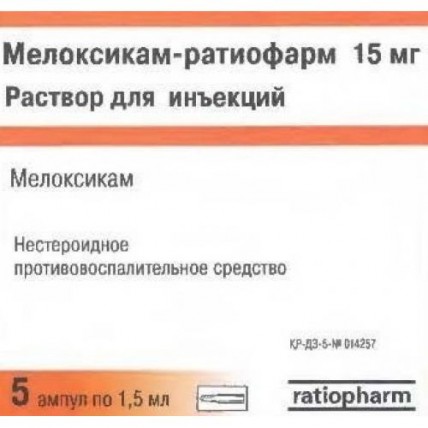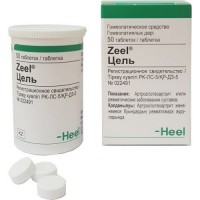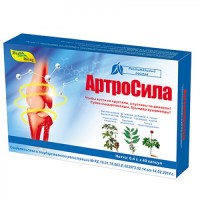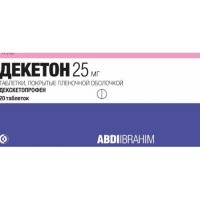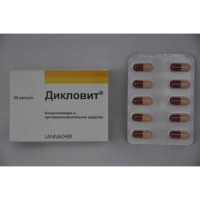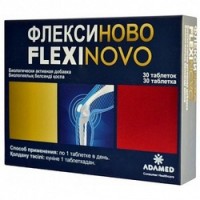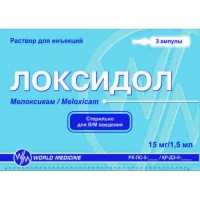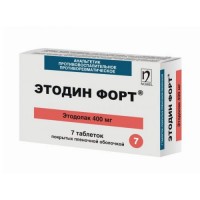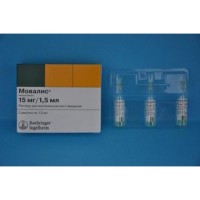Meloxicam-ratiopharm 15 mg / 1.5 ml 5's solution for injection in ampoules
- $20.80
Sku:
8a419f8539fc
Ingredient:
Meloxicam
The instruction for medical use
of medicine
Meloksikam-ratiopharm
the Trade name
Meloksikam-ratiopharm
the International unlicensed
name Meloksikam Lekarstvennaya a form
Solution for injections of 15 mg / 1.5 ml
Structure
One ampoule contains
active agent - a meloksikam of 15 mg
excipients: Megluminum, glikofurol, half-oxameasures 188, sodium chloride, glycine, sodium hydroxide, water for injections
the Description
the Yellow transparent solution with a green shade which is not containing particles
Pharmacotherapeutic group
Anti-inflammatory and antirheumatic drugs. Oksikama. Meloksikam
the ATX M01AC06 Code
the Pharmacological
Meloksikam Pharmacokinetics properties contacts proteins of plasma (99%). Meloksikam is substantially metabolized by a liver, brought in the form of metabolites in equal shares with urine and excrements. The average time of semi-removal is about 20 hours. The general clearance in plasma is 8 ml/min.
A pharmacodynamics
Meloksikam is a non-steroidal anti-inflammatory drug (NPVP) from group of substances of an oksikam with anti-inflammatory, soothing and febrifugal properties. The mechanism of action is connected with decrease in biosynthesis of prostaglandins as a result of oppression of enzymatic activity of cyclooxygenase (COG).
Indications
For short-term symptomatic treatment in inflammatory and degenerative diseases of the joints which are followed by a pain syndrome including:
- the osteoarthrosis
- a pseudorheumatism
-
the Route of administration and a dosage ankylosing a spondylitis
Meloksikam-ratiopharm is appointed in the form of a deep intramuscular injection within 3-5 days (depending on weight of a state). For the subsequent treatment it is necessary to accept in the form of tablets.
Osteoarthrosis: the recommended dose makes 7.5 mg a day (a half of 15 mg - howl ampoules). In the absence of improvement the dose can be increased up to 15 mg/day.
The pseudorheumatism ankylosing a spondylitis: 15 mg a day (1 ampoule).
Elderly patients and patients with the increased risk of collateral influences
have a Recommended dosage in a pseudorheumatism or an ankylosing spondylitis makes 7.5 mg a day.
The renal failure
with light or moderate limitation of function of kidneys (the clearance of creatinine (CC) more than 25 ml/min.) reduction of a dose is not required From patients.
At dialysis patients with a heavy renal failure it is not allowed to exceed a daily dose in 7.5 mg of a meloksikam.
The abnormal liver function
with light or moderate limitation of function of a liver reduction of a dose is not required From patients.
Side effects
Often
- dizziness, a headache
- anemia
- dyspepsia, nausea, vomiting, an eructation, an abdominal pain, diarrhea, a constipation, a meteorism,
- a skin itching, skin rash
- hypostasis, including hypostasis of the lower extremities puffiness, in the injection site
Sometimes
- vertigo, a ring in ears, drowsiness, confusion of consciousness, orientation disturbance, emotional lability
- a cardiopalmus, increase in blood pressure, inflows
- stomatitis, an esophagitis, gastrointestinal bleedings, stomach ulcers and a duodenum
- a small tortoiseshell
- passing changes of indicators of function of a liver (increase in transaminases, bilirubin), creatinine, urea
- a leukopenia, thrombocytopenia, an agranulocytosis
Seldom
- confusion of consciousness, mood swing, insomnia, nightmares,
- disorders of vision, conjunctivitis
- hepatitis
- gastrointestinal perforation, gastritis, colitis
- anaphylactic/anaphylactoid reactions, a small tortoiseshell, bullous reactions, Stephens-Johnson's syndrome, toxic epidermal necrosis, an exudative mnogoformny erythema, a photosensitization
- asthma attacks (at patients with an allergy to acetylsalicylic acid or other NPVP)
- a renal failure, interstitial nephrite, a glomerulonephritis, a nephrotic syndrome, change of indicators of function of kidneys (increase in level of creatinine, urea, an albuminuria, a hamaturia), a sharp ischuria, difficulty at urination
of the Contraindication
- hypersensitivity to a meloksikam or one of other components or to other NPVP, including acetylsalicylic acid
- to patients at whom after intake of acetylsalicylic acid or other NPVP symptoms of asthma, nasal polyps developed the Quincke's disease or a small tortoiseshell, is not allowed to give to meloksika
- the patients receiving anticoagulants
- system disturbances of fibrillation
- active ulcers in digestive tract or the anamnesis of recurrent ulcers of digestive tract
- a heavy liver failure
- a heavy renal failure, the progressing disease of kidneys
- gastrointestinal bleedings, cerebrovascular bleedings or other increased tendency to bleedings
- dekompensirovanny heart failure
- a postoperative pain syndrome after aortocoronary shunting
- pregnancy and the period of a lactation
- the children's and teenage period up to 18 years
Medicinal interactions
- a methotrexate: increase in concentration of a methotrexate in serum and the contributing factor of emergence of a cytopenia.
- the concomitant use of several NPVP can increase risk of gastrointestinal ulcers and bleedings
- oral anticoagulants, tiklopidin, thrombolytic means, antiagregant, selective serotonin reuptake inhibitors: the increased risk of bleeding, is necessary tshchatelnyycontrol a hemostasis
- lithium: discharge of lithium can be reduced. Therefore it is necessary to watch attentively concentration of lithium in serum if lithium salts are entered.
- diuretics: can lead to a renal failure, especially at the dehydrated patients. It is necessary to provide adequately with liquid and to check function of kidneys.
- hormonal contraceptive means: NPVP reduce efficiency of contraceptives
- antihypertensive drugs (beta-blockers, APF inhibitors and antagonists of angiotensin II): synergy effect on reduction of glomerular filtration of kidneys, at patients with a renal failure it can lead ment of an acute renal failure and weakening of antihypertensive effect of APF inhibitors owing to blocking of prostaglandins-vazodilatatorov
- holestiramin: connects to meloksika in digestive tract that leads to the accelerated removal of drug from an organism
- cyclosporine: strengthening of nephrotoxicity of cyclosporine, it is necessary to exercise control of function of kidneys
- NPVS can cause a delay of sodium, potassium, liquid and to weaken effect of saluretics. As a result, at predisposed patients the purpose of NPVS can lead to progressing of heart failure and hypertensia.
At a concomitant use of antiacid means, Cimetidinum, digoxin of clinically significant interactions it was not observed.
Meloksikam-ratiopharm patients at whom is in the anamnesis after prescribing of acetylsalicylic acid or other NPVS should not appoint special instructions symptoms of bronchial asthma, polyps mucous a nose, a Quincke's disease, a small tortoiseshell were observed.
As well as with other NPVP it is necessary to be careful at use Meloksikam-ratiopharm at patients with digestive tract diseases in the anamnesis and also at the patients receiving anticoagulating therapy. In case of developing of a round ulcer or gastrointestinal bleeding, it is necessary to refuse reception of a meloksikam.
When using NPVP there are rare messages about development of such serious skin reactions as exfoliative dermatitis, Stephens-Johnson's syndrome, a toxic epidermal necrolysis, up to a lethal outcome. In case of side reaction from skin and mucous, in such cases it is necessary to consider a question of the termination of administration of drug. The undesirable phenomena from skin and mucous membranes at patients with risk of development of the listed reactions are noted within the first month of treatment.
NPVP suppress synthesis of prostaglandin participating in maintenance of a renal blood-groove. At patients with the lowered renal blood-groove the acceleration of a decompensation of kidneys is possible. However, after cancellation of therapy of NPVP the function of kidneys is restored. Risk of development of similar reactions at patients with dehydration phenomena, stagnant heart failure, cirrhosis, a nephrotic syndrome, a serious illness of kidneys, at the patients who are receiving diuretics and also transferred the considerable surgery which led to a hypovolemia is especially big. At such patients from the very beginning it is necessary to exercise control of a diuresis and function of kidneys.
In rare instances NPVS can cause interstitial nephrite, a glomerulonephritis, necrosis of marrow of kidneys or a nephrotic syndrome.
At patients with a renal failure of an end-stage and being on a hemodialysis drug it should not be appointed in a dose more than 7.5 mg/days. The dose decline is not required from patients with not profound or moderate renal failure (KK more than 25 ml/min.).
It was in rare instances reported about increase in level of serumal transaminases or change of other parameters characterizing function of a liver. In most cases aberrations were insignificant and passing. If aberrations are expressed or have constant character, it is necessary to stop use of drug and to conduct control laboratory researches.
The dose decline is not required from patients with clinically not progressing cirrhosis.
Meloksikam-ratiopharm should be applied with care at the exhausted people and elderly patients at whom function of kidneys, a liver or heart is more often broken.
Meloksikam-ratiopharm can mask symptoms of the basic infectious disease.
Features of influence of medicine on ability to run the vehicle or potentially dangerous mechanisms
At emergence of such side effects as a disorder of vision, dizziness, drowsiness, is recommended to refrain from driving or control of cars.
Overdose
Symptoms: drowsiness, nausea, vomiting, a stomach ache, bleedings in digestive tract, increase in blood pressure, a renal failure, an abnormal liver function, respiratory depression, a spasm coma, cardiovascular collapse, anaphylactoid reactions.
Treatment: symptomatic therapy, reception of a holestiramin of 4 g 3 times a day accelerates removal of a meloksikam.
A form of release and packing
On 1.5 ml of drug in ampoules from colourless glass with the marking put on an ampoule. On 5 ampoules in a container from plastic together with the instruction for use in the state and Russian languages place in a pack from cardboard.
To Store storage conditions at a temperature not above 25ºС.
To store out of children's reach!
3 years
not to apply a period of storage after an expiration date.
Prescription status
According to the prescription
the Producer/packer
"HELP S.A.", Greece, 45501 Pedini
Vladelets of the registration certificate
"ratiopharm GmbH", Germany
the Address of the organization accepting in the territory of the Republic of Kazakhstan claims from consumers on quality of products (goods)
of ratiopharm Kazakhstan LLP, Almaty, Al-Farabi Ave., 19, BC Nurly-Tau, 1B, office 603, ph. (727) 311 06 15, fax (727) 311 07 34, e-mail:
teva@teva.kz
of medicine
Meloksikam-ratiopharm
the Trade name
Meloksikam-ratiopharm
the International unlicensed
name Meloksikam Lekarstvennaya a form
Solution for injections of 15 mg / 1.5 ml
Structure
One ampoule contains
active agent - a meloksikam of 15 mg
excipients: Megluminum, glikofurol, half-oxameasures 188, sodium chloride, glycine, sodium hydroxide, water for injections
the Description
the Yellow transparent solution with a green shade which is not containing particles
Pharmacotherapeutic group
Anti-inflammatory and antirheumatic drugs. Oksikama. Meloksikam
the ATX M01AC06 Code
the Pharmacological
Meloksikam Pharmacokinetics properties contacts proteins of plasma (99%). Meloksikam is substantially metabolized by a liver, brought in the form of metabolites in equal shares with urine and excrements. The average time of semi-removal is about 20 hours. The general clearance in plasma is 8 ml/min.
A pharmacodynamics
Meloksikam is a non-steroidal anti-inflammatory drug (NPVP) from group of substances of an oksikam with anti-inflammatory, soothing and febrifugal properties. The mechanism of action is connected with decrease in biosynthesis of prostaglandins as a result of oppression of enzymatic activity of cyclooxygenase (COG).
Indications
For short-term symptomatic treatment in inflammatory and degenerative diseases of the joints which are followed by a pain syndrome including:
- the osteoarthrosis
- a pseudorheumatism
-
the Route of administration and a dosage ankylosing a spondylitis
Meloksikam-ratiopharm is appointed in the form of a deep intramuscular injection within 3-5 days (depending on weight of a state). For the subsequent treatment it is necessary to accept in the form of tablets.
Osteoarthrosis: the recommended dose makes 7.5 mg a day (a half of 15 mg - howl ampoules). In the absence of improvement the dose can be increased up to 15 mg/day.
The pseudorheumatism ankylosing a spondylitis: 15 mg a day (1 ampoule).
Elderly patients and patients with the increased risk of collateral influences
have a Recommended dosage in a pseudorheumatism or an ankylosing spondylitis makes 7.5 mg a day.
The renal failure
with light or moderate limitation of function of kidneys (the clearance of creatinine (CC) more than 25 ml/min.) reduction of a dose is not required From patients.
At dialysis patients with a heavy renal failure it is not allowed to exceed a daily dose in 7.5 mg of a meloksikam.
The abnormal liver function
with light or moderate limitation of function of a liver reduction of a dose is not required From patients.
Side effects
Often
- dizziness, a headache
- anemia
- dyspepsia, nausea, vomiting, an eructation, an abdominal pain, diarrhea, a constipation, a meteorism,
- a skin itching, skin rash
- hypostasis, including hypostasis of the lower extremities puffiness, in the injection site
Sometimes
- vertigo, a ring in ears, drowsiness, confusion of consciousness, orientation disturbance, emotional lability
- a cardiopalmus, increase in blood pressure, inflows
- stomatitis, an esophagitis, gastrointestinal bleedings, stomach ulcers and a duodenum
- a small tortoiseshell
- passing changes of indicators of function of a liver (increase in transaminases, bilirubin), creatinine, urea
- a leukopenia, thrombocytopenia, an agranulocytosis
Seldom
- confusion of consciousness, mood swing, insomnia, nightmares,
- disorders of vision, conjunctivitis
- hepatitis
- gastrointestinal perforation, gastritis, colitis
- anaphylactic/anaphylactoid reactions, a small tortoiseshell, bullous reactions, Stephens-Johnson's syndrome, toxic epidermal necrosis, an exudative mnogoformny erythema, a photosensitization
- asthma attacks (at patients with an allergy to acetylsalicylic acid or other NPVP)
- a renal failure, interstitial nephrite, a glomerulonephritis, a nephrotic syndrome, change of indicators of function of kidneys (increase in level of creatinine, urea, an albuminuria, a hamaturia), a sharp ischuria, difficulty at urination
of the Contraindication
- hypersensitivity to a meloksikam or one of other components or to other NPVP, including acetylsalicylic acid
- to patients at whom after intake of acetylsalicylic acid or other NPVP symptoms of asthma, nasal polyps developed the Quincke's disease or a small tortoiseshell, is not allowed to give to meloksika
- the patients receiving anticoagulants
- system disturbances of fibrillation
- active ulcers in digestive tract or the anamnesis of recurrent ulcers of digestive tract
- a heavy liver failure
- a heavy renal failure, the progressing disease of kidneys
- gastrointestinal bleedings, cerebrovascular bleedings or other increased tendency to bleedings
- dekompensirovanny heart failure
- a postoperative pain syndrome after aortocoronary shunting
- pregnancy and the period of a lactation
- the children's and teenage period up to 18 years
Medicinal interactions
- a methotrexate: increase in concentration of a methotrexate in serum and the contributing factor of emergence of a cytopenia.
- the concomitant use of several NPVP can increase risk of gastrointestinal ulcers and bleedings
- oral anticoagulants, tiklopidin, thrombolytic means, antiagregant, selective serotonin reuptake inhibitors: the increased risk of bleeding, is necessary tshchatelnyycontrol a hemostasis
- lithium: discharge of lithium can be reduced. Therefore it is necessary to watch attentively concentration of lithium in serum if lithium salts are entered.
- diuretics: can lead to a renal failure, especially at the dehydrated patients. It is necessary to provide adequately with liquid and to check function of kidneys.
- hormonal contraceptive means: NPVP reduce efficiency of contraceptives
- antihypertensive drugs (beta-blockers, APF inhibitors and antagonists of angiotensin II): synergy effect on reduction of glomerular filtration of kidneys, at patients with a renal failure it can lead ment of an acute renal failure and weakening of antihypertensive effect of APF inhibitors owing to blocking of prostaglandins-vazodilatatorov
- holestiramin: connects to meloksika in digestive tract that leads to the accelerated removal of drug from an organism
- cyclosporine: strengthening of nephrotoxicity of cyclosporine, it is necessary to exercise control of function of kidneys
- NPVS can cause a delay of sodium, potassium, liquid and to weaken effect of saluretics. As a result, at predisposed patients the purpose of NPVS can lead to progressing of heart failure and hypertensia.
At a concomitant use of antiacid means, Cimetidinum, digoxin of clinically significant interactions it was not observed.
Meloksikam-ratiopharm patients at whom is in the anamnesis after prescribing of acetylsalicylic acid or other NPVS should not appoint special instructions symptoms of bronchial asthma, polyps mucous a nose, a Quincke's disease, a small tortoiseshell were observed.
As well as with other NPVP it is necessary to be careful at use Meloksikam-ratiopharm at patients with digestive tract diseases in the anamnesis and also at the patients receiving anticoagulating therapy. In case of developing of a round ulcer or gastrointestinal bleeding, it is necessary to refuse reception of a meloksikam.
When using NPVP there are rare messages about development of such serious skin reactions as exfoliative dermatitis, Stephens-Johnson's syndrome, a toxic epidermal necrolysis, up to a lethal outcome. In case of side reaction from skin and mucous, in such cases it is necessary to consider a question of the termination of administration of drug. The undesirable phenomena from skin and mucous membranes at patients with risk of development of the listed reactions are noted within the first month of treatment.
NPVP suppress synthesis of prostaglandin participating in maintenance of a renal blood-groove. At patients with the lowered renal blood-groove the acceleration of a decompensation of kidneys is possible. However, after cancellation of therapy of NPVP the function of kidneys is restored. Risk of development of similar reactions at patients with dehydration phenomena, stagnant heart failure, cirrhosis, a nephrotic syndrome, a serious illness of kidneys, at the patients who are receiving diuretics and also transferred the considerable surgery which led to a hypovolemia is especially big. At such patients from the very beginning it is necessary to exercise control of a diuresis and function of kidneys.
In rare instances NPVS can cause interstitial nephrite, a glomerulonephritis, necrosis of marrow of kidneys or a nephrotic syndrome.
At patients with a renal failure of an end-stage and being on a hemodialysis drug it should not be appointed in a dose more than 7.5 mg/days. The dose decline is not required from patients with not profound or moderate renal failure (KK more than 25 ml/min.).
It was in rare instances reported about increase in level of serumal transaminases or change of other parameters characterizing function of a liver. In most cases aberrations were insignificant and passing. If aberrations are expressed or have constant character, it is necessary to stop use of drug and to conduct control laboratory researches.
The dose decline is not required from patients with clinically not progressing cirrhosis.
Meloksikam-ratiopharm should be applied with care at the exhausted people and elderly patients at whom function of kidneys, a liver or heart is more often broken.
Meloksikam-ratiopharm can mask symptoms of the basic infectious disease.
Features of influence of medicine on ability to run the vehicle or potentially dangerous mechanisms
At emergence of such side effects as a disorder of vision, dizziness, drowsiness, is recommended to refrain from driving or control of cars.
Overdose
Symptoms: drowsiness, nausea, vomiting, a stomach ache, bleedings in digestive tract, increase in blood pressure, a renal failure, an abnormal liver function, respiratory depression, a spasm coma, cardiovascular collapse, anaphylactoid reactions.
Treatment: symptomatic therapy, reception of a holestiramin of 4 g 3 times a day accelerates removal of a meloksikam.
A form of release and packing
On 1.5 ml of drug in ampoules from colourless glass with the marking put on an ampoule. On 5 ampoules in a container from plastic together with the instruction for use in the state and Russian languages place in a pack from cardboard.
To Store storage conditions at a temperature not above 25ºС.
To store out of children's reach!
3 years
not to apply a period of storage after an expiration date.
Prescription status
According to the prescription
the Producer/packer
"HELP S.A.", Greece, 45501 Pedini
Vladelets of the registration certificate
"ratiopharm GmbH", Germany
the Address of the organization accepting in the territory of the Republic of Kazakhstan claims from consumers on quality of products (goods)
of ratiopharm Kazakhstan LLP, Almaty, Al-Farabi Ave., 19, BC Nurly-Tau, 1B, office 603, ph. (727) 311 06 15, fax (727) 311 07 34, e-mail:
teva@teva.kz
